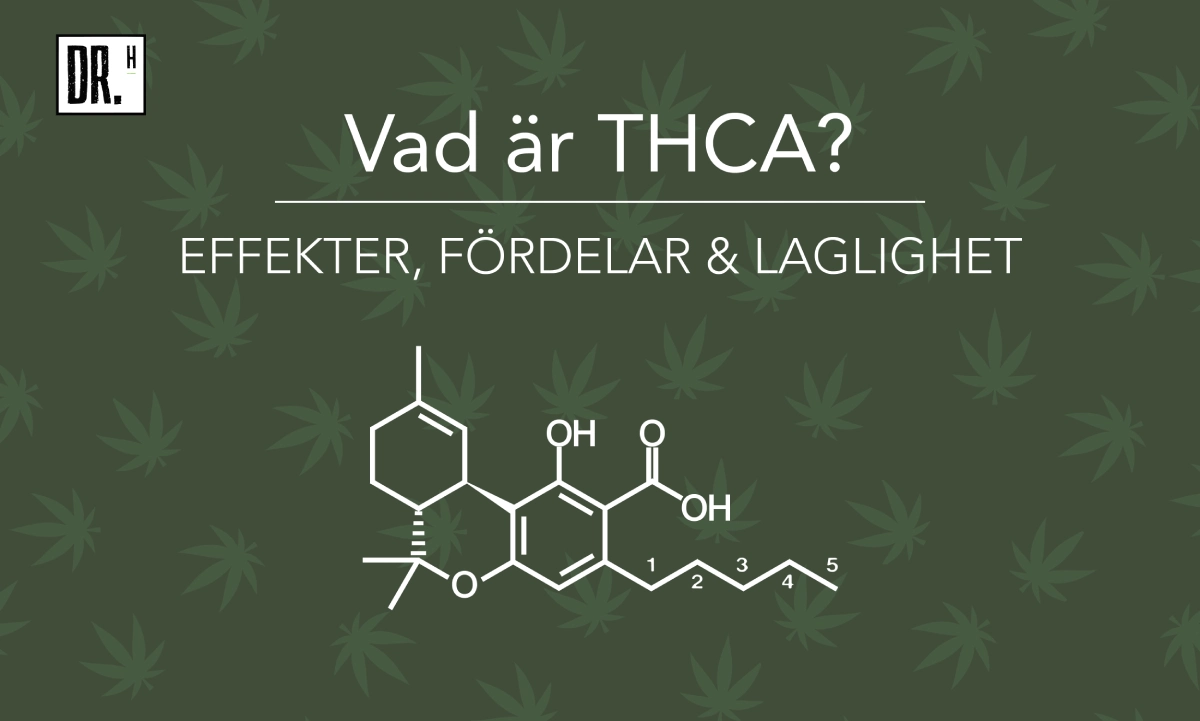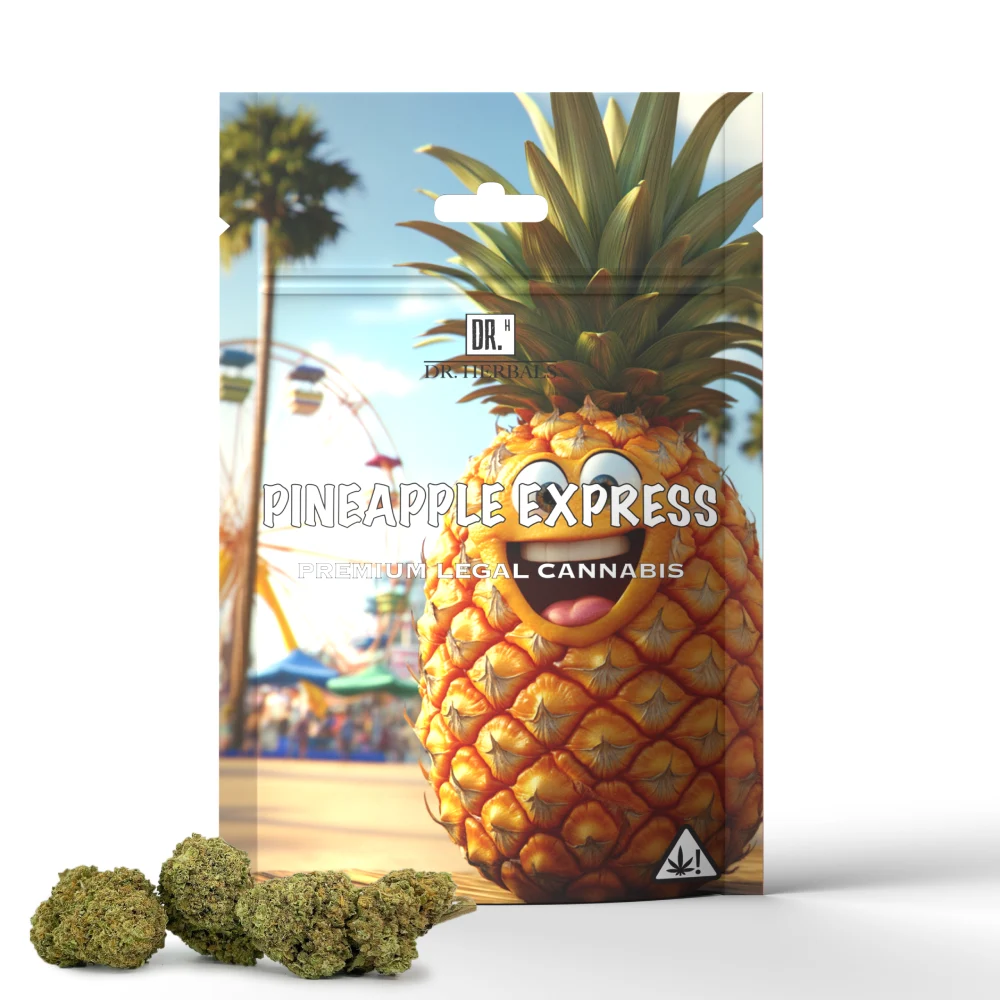
På denna sida finner du information om:
THCA, eller tetrahydrocannabinolic acid, är ett naturligt ämne som finns i rå cannabis. Det är en av de vanligaste cannabinoiderna i växten och är särskilt intressant eftersom det är föregångaren till THC, det ämne som är känt för sina rusgivande effekter.
Vad betyder THCA?
THCA står för Tetrahydrocannabinolic Acid och är en naturligt förekommande cannabinoidsyra som återfinns i råa, obearbetade cannabisplantor. När växten skördas och torkas innehåller den främst THCA, inte THC. Det är först när växtmaterialet utsätts för värme – till exempel genom rökning, vaping eller bakning – som THCA omvandlas till THC. Denna process kallas dekarboxylering.
Kort sagt: THCA är den ”sovande” formen av THC som aktiveras genom värme.
Hur skiljer sig THCA från THC?
Det är lätt att blanda ihop THCA och THC, men det finns flera tydliga skillnader mellan dessa två ämnen:
THCA och THC är två olika former av samma cannabinoid, men med helt olika egenskaper.
THCA (Tetrahydrocannabinolic Acid) är den sura, naturliga formen av THC som finns i rå och obehandlad cannabis. Den är inte psykoaktiv i sitt ursprungliga tillstånd, vilket innebär att den inte ger något rus. För att THCA ska omvandlas till THC krävs upphettning, till tillagning – en process som kallas dekarboxylering. Först efter denna omvandling blir ämnet psykoaktivt.
THC (Tetrahydrocannabinol) är den aktiva formen som uppstår när THCA har hettats upp. Det är THC som är känt för sina rusgivande effekter och som påverkar kroppens endocannabinoida system.
Skillnaden mellan de två ligger alltså i deras kemiska struktur, psykoaktivitet och hur de konsumeras.
| Egenskap | THCA | THC |
|---|---|---|
| Förekomst | Finns i rå cannabis | Bildas genom uppvärmning |
| Psykoaktivitet | Icke-psykoaktiv i rå form | Psykoaktiv |
| Kemisk struktur | Har karboxylgrupp (COOH) | Saknar karboxylgrupp |
Vad händer med THCA när det värms upp?
När cannabis som innehåller THCA upphettas, vid tillagning, förlorar molekylen en karboxylgrupp (COOH) – detta kallas dekarboxylering. Resultatet blir att THCA omvandlas till THC.
Blir man hög av att äta THCA Gummies?
Nej, THCA-gummies orsakar inte rus så länge de inte har upphettats. THCA är en icke-psykoaktiv cannabinoid i sitt naturliga tillstånd. För att THCA ska omvandlas till psykoaktivt THC krävs väldigt hög värme – en process som kallas dekarboxylering.
Om du äter THCA-gummies utan att de hettats upp, t.ex. i rå eller lågtempererad form, så sker normalt sett ingen omvandling till THC. Därför ger de inte samma effekt som THC-baserade produkter.
Däremot är det alltid viktigt att kontrollera produktens innehåll och tillverkningsprocess, eftersom vissa tillverkare kan ha förvärmt extrakten eller kombinerat dem med THC. Vi på DR. Herbals säljer inte gummies innehållande THCA och rekommenderar ingen att använda ämnet för berusning. Blogginlägget är rent av enbart informativt.
Vanliga frågor om THCA
✅ Är THCA lagligt i Sverige?
Lagstiftningen kring cannabinoider varierar mellan länder. I Sverige avgörs lagligheten främst av växtens ursprung. Så länge produkten kommer från EU-godkända frösorter av industrihampa är den laglig. THCA är i sig inte klassat som narkotika och är lagligt i Sverige, förutsatt att det härrör från godkänd industrihampa och inte upphettas.
✅ Är THCA och THC samma sak?
Nej. THCA är förstadiet till THC och saknar rusgivande effekt i sitt råa tillstånd. Det krävs extrem värme för att omvandla THCA till THC.
✅ Finns det THCA-produkter?
Ja, det finns produkter som innehåller THCA, som till exempel rå cannabis, extrakt och oljor, men det är viktigt att kontrollera produktinformationen och lokala regler innan köp. Hos DR. Herbals säljer vi Vapes, Buds och andra intressanta produkter innehållande THCA – det där dock viktigt att notera att produkterna säljs som samlarobjekt och inte för konsumtion.


